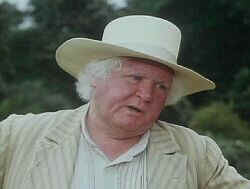
| home | films | tv | stage | biog | best scene | shop | news | discussion | download | interviews | more | all the sites | русский |
Ken Russell an ageing enfant terrible

|
The title comes from A British Picture, Ken Russell asking about himself: what do you call an ageing enfant terrible? In this in depth article Darren Arnold looks at the later works of Ken Russell... There has for many years now been some debate over the quality of Ken Russell’s "later" work - by later, that is largely meant to mean anything after 1975. Looking at the last decade of Russell’s work, it is interesting to note that while many of the films he directed during this period did not scale the heights of The Devils or The Music Lovers, they nonetheless maintained the Russell tradition of producing work that was very watchable. In many ways, Russell’s latest "decline" came about after the reasonable success of The Rainbow, the last of the three films Russell would direct for Vestron. Following his successful three-picture deal, Russell was understandably popular with the Vestron camp, and was all set to sign another triple-flick contract when the company hit upon hard times and subsequently went out of business. This was a terrible pity, as Russell was definitely re-emerging as a feature maker, now that he had the backing of a company that respected his creative wishes. Not letting this act as too much of a setback, Russell was promptly employed to work on an American TV movie. Women and Men: Stories of Seduction was a routine effort that starred Peter Weller and Molly Ringwald. All was not completely lost after the Vestron collapse, as Dan Ireland (Vestron producer) had picked up a job with TriMark Pictures, and quickly negotiated a deal for Russell to direct a feature for the studio.
Whore was nine years ago, and was the last Russell cinema feature to date. Since then, he has made the indifferent TV film Prisoner of Honor (starring and co-produced by Richard Dreyfuss), and the very successful BBC adaptation of another D.H. Lawrence book, Lady Chatterley’s Lover. Although Lady Chatterley was clearly pandering to a mass television audience (with, for example, the casting of British TV favourite Sean Bean), it played an important part in putting Russell back into the public eye (it’s also worth noting that a truncated version was given a cinema release, although this cannot be counted as a feature due to it being culled from a television source). Russell also continued to make his annual film for The South Bank Show, and subjects included the composers Bax and Bruckner. He further extended his interest in composers by making the BBC2 film The Mystery of Dr. Martinu, although this proved to be one of the most insignificant television films that the director has ever put his name to. A rare latter-day feature-length Russell work to grace our screens was his version of Treasure Island, cheekily titled Ken Russell’s Treasure Island, which was screened during December 1995.
His continued absence from the cinema feature scene is rather depressing, and the fanfare that sounded the arrival of the film version of Evita provided a reminder for many that Russell was the original choice for director all those years ago. However, around the same time of Evita’s release, one intriguing project appeared to be at hand: House of Mirth, a screenplay by Russell and his second wife Vivian Jolly, was tentatively slated to start shooting in April 1997. Although this Edith Wharton adaptation doesn’t sound particularly intriguing at first, the fact that Dustin Hoffman was set to star and produce makes the situation a lot more interesting. Why? Well, ten years ago, following a rare late night showing of Mahler on Channel 4, there was a half-hour documentary on Russell entitled Angels & Devils. Russell himself was interviewed in the programme, and in a rant squarely aimed at big Hollywood stars, singled out Dustin Hoffman for particularly stinging abuse.
Those who tend to think that Russell’s later work is, in general, vastly inferior to his earlier work may like to ponder on a couple of points. For one, Russell has long since ceased to be a fashionable director, and has struggled to get backing for projects. Just because he went out of fashion doesn’t necessarily mean that he lost his creativity, but scratching around for projects is hardly conducive to the creation of top-notch productions. Secondly, all of Russell’s later work (excepting perhaps Lady Chatterley) has been low budget stuff, aimed at a fairly small market (either video or cable); therefore, this relative lack of exposure has deemed many people to conclude that these films have been flops. Of course, as many fine works testify, low profile doesn’t have to be synonymous with low quality. Darren Arnold
|
More interviews and articles
| home | films | tv | stage | biog | best scene | shop | news | discussion | download | interviews | more | all the sites | русский |
www.iainfisher.com / send mail / © 1998- 2012 Iain Fisher